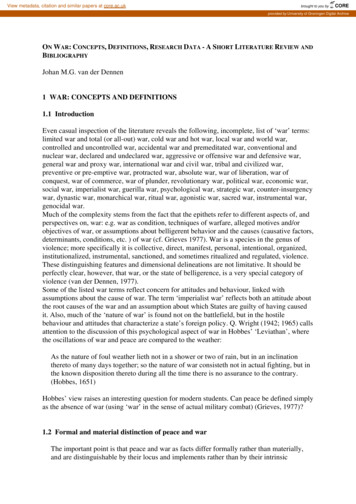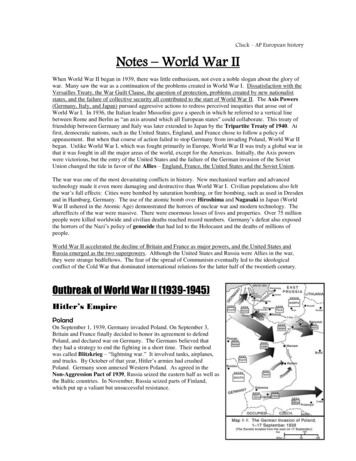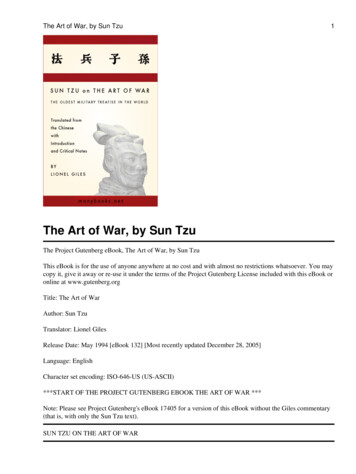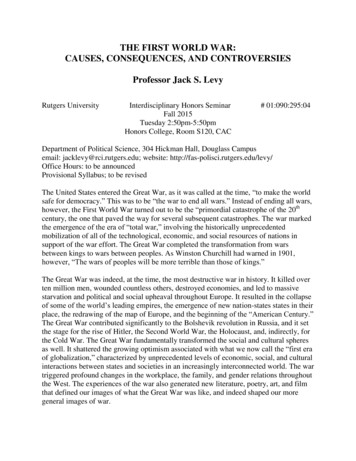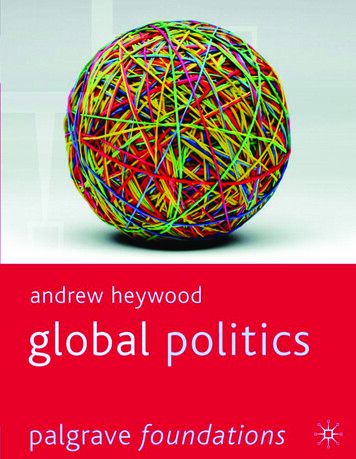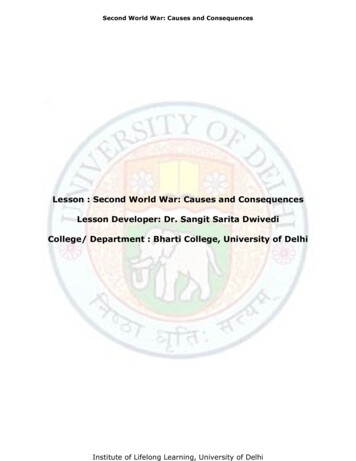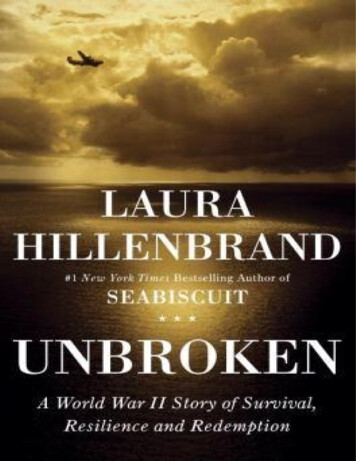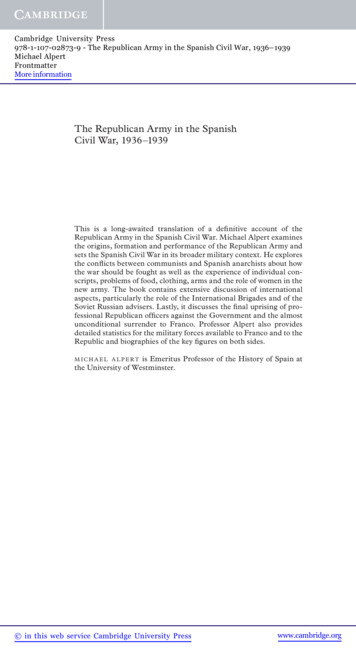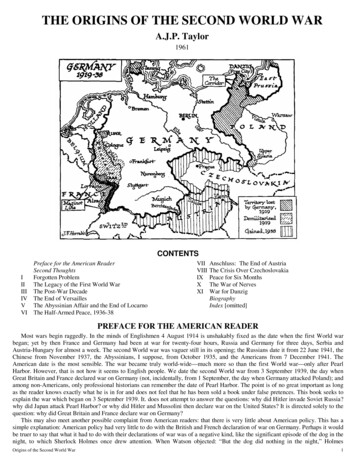
Transcription
THE ORIGINS OF THE SECOND WORLD WARA.J.P. Taylor1961CONTENTSIIIIIIIVVVIPreface for the American ReaderSecond ThoughtsForgotten ProblemThe Legacy of the First World WarThe Post-War DecadeThe End of VersaillesThe Abyssinian Affair and the End of LocarnoThe Half-Armed Peace, 1936-38VIIVIIIIXXXIAnschluss: The End of AustriaThe Crisis Over CzechoslovakiaPeace for Six MonthsThe War of NervesWar for DanzigBiographyIndex [omitted]PREFACE FOR THE AMERICAN READERMost wars begin raggedly. In the minds of Englishmen 4 August 1914 is unshakably fixed as the date when the first World warbegan; yet by then France and Germany had been at war for twenty-four hours, Russia and Germany for three days, Serbia andAustria-Hungary for almost a week. The second World war was vaguer still in its opening; the Russians date it from 22 June 1941, theChinese from November 1937, the Abyssinians, I suppose, from October 1935, and the Americans from 7 December 1941. TheAmerican date is the most sensible. The war became truly world-wide—much more so than the first World war—only after PearlHarbor. However, that is not how it seems to English people. We date the second World war from 3 September 1939, the day whenGreat Britain and France declared war on Germany (not, incidentally, from 1 September, the day when Germany attacked Poland); andamong non-Americans, only professional historians can remember the date of Pearl Harbor. The point is of no great important as longas the reader knows exactly what he is in for and does not feel that he has been sold a book under false pretences. This book seeks toexplain the war which began on 3 September 1939. It. does not attempt to answer the questions: why did Hitler invade Soviet Russia?why did Japan attack Pearl Harbor? or why did Hitler and Mussolini then declare war on the United States? It is directed solely to thequestion: why did Great Britain and France declare war on Germany?This may also meet another possible complaint from American readers: that there is very little about American policy. This has asimple explanation: American policy had very little to do with the British and French declaration of war on Germany. Perhaps it wouldbe truer to say that what it had to do with their declarations of war was of a negative kind, like the significant episode of the dog in thenight, to which Sherlock Holmes once drew attention. When Watson objected: “But the dog did nothing in the night,” HolmesOrigins of the Second World War1
answered: “That was the significant episode.” Even so, the United States could not avoid playing a great, maybe a decisive, part inEuropean affairs. The German problem, as it existed between the wars, was largely the creation of American policy. The first Worldwar would obviously have had a different end if it had not been for American intervention: the Allies, to put it bluntly, would not havewon. Equally, the victory over Germany would have had a different character if the United States had been an Allied, not anAssociated, Power. Everyone knows how the detachment of the United States from the European Allies was asserted when the Senaterefused to ratify the treaty of Versailles and, with it, American membership in the League of Nations; but this detachment existed evenin the days of closest co-operation, and ratification of the treaty would not have made all that much difference. Woodrow Wilsonregarded the Allies with almost as much distrust as he regarded Germany, or perhaps with more; and American membership in theLeague, as he envisaged it, would have been far from an asset to the Allied side.Nor did the action of the Senate imply a retreat into isolation. American policy was never more active and never more effective inregard to Europe than in the nineteen-twenties. Reparations were settled; stable finances were restored; Europe was pacified: allmainly due to the United States. This policy of recovery followed the doctrine of Keynes (and of other economists) that Europe couldbe made prosperous only by making Germany prosperous. The recovery of Germany was America’s doing. It was welcomed by mostpeople in Great Britain and even by a certain number in France. It would have happened, to a lesser extent, in any case. Nevertheless,American policy was a powerful obstacle against any attempt to retard the recovery of Germany and a considerable assistance to thosewho promoted it. What indeed—a thought which occurred to many Englishmen also—can you do with Germany except make her thestrongest Power in Europe? Still, the process might have taken longer if Americans had not been so insistent that Germany was themain pillar of European peace and civilisation. The treaty of Locarno and the admission of Germany to the League won Americanapproval; this was in fact a strong motive for them. The same applied to disarmament. Every step towards treating Germany as anequal and towards dismantling the special securities which France obtained at the end of the first World war received Americanbacking, tempered only by impatience that the steps were slow and halting.Until 1931 or thereabouts, the policy of the Western Powers, Great Britain and France, met broadly with American approval. Thenthings changed. This was partly because of events in the Far East. When Japan acted in Manchuria, the United States wished to enlistthe League of Nations against her; while Great Britain and France thought that the League had enough to do in Europe withoutattempting to extend its principles to the Far East. The divergence went deeper. Americans attached great value to “non-recognition”;with a fine old-fashioned loyalty to nineteenth-century liberalism, they believed that moral disapproval would be effective in itself.The belief had already been proved false. The United States had refused to recognize the Soviet Union ever since 1917 without theslightest effect on anyone. The British particularly thought that the same result, or lack of result, would follow if they applied theprinciple of non-recognition to Japan. In their opinion, it was more important to restore peace in the Far East than to preserve theirmoral virtue. They succeeded, but at the price of permanently offending liberal sentiment in the United States. All this was dead stuffwhen Republican rule was brought to an end and Franklin D. Roosevelt became President. His victory was, among other things, avictory for isolationism in American foreign policy; and there is no evidence that he disapproved of the isolationist legislation whichthe Democratic majority pushed through Congress. The British and French were told, in effect, by those who had been their closestfriends in the United States that they must face the German problem unaided. More than that, American policy cut across their efforts.President Roosevelt’s first act in foreign affairs was to wreck the World Economic Conference, by means of which the Britishgovernment had hoped to make Nazi autarchy unnecessary.American isolationism reinforced isolationism elsewhere. British students learnt from American historians that the first World warwas a blunder and that Germany was a justly aggrieved Power. British liberals learnt from progressive American politicians that warswere caused by armament manufacturers. Americans, having repudiated the treaty of Versailles themselves, were now eager thatothers should repudiate it also. The effect of American isolationism was felt in more practical ways. It supplied a strong argument forthose who hesitated to make collective security a reality. When it was proposed to cut off Italy’s supply of oil during the Abyssiniancrisis, the objection was at once raised that American oil would supply the deficiency; and no assurance to the contrary came, or couldcome, from the American government. Again, when the British government were urged to close the Suez canal against Italy, in breachof the Constantinople convention of 1889, the same answer was given: the United States would not allow it. No doubt these obstaclescould have been overcome if British and French statesmen had been sufficiently resolute; but where men hesitated, Americanabstention helped to tip the scale. In much the same way, the American attitude was invoked to justify non-intervention in the Spanishcivil war; any attempt to interfere with Franco’s supply of arms would, it was argued, meet with resistance from the United States aswell as from Germany and Italy. Yet, at the same time, Great Britain and France earned censure in the United States for failing to dothings which American isolationism prevented them from doing. In particular, they were condemned for refusing to prolong a barren“non-recognition” once Italy had conquered Abyssinia.In the autumn of 1937 American policy began to change. This was mainly due to the outbreak of war between Japan and China inthe Far East, where Americans would have liked to see action by the European Powers, though they could promise none themselves.More than this, President Roosevelt set out to educate American opinion. As always, he proceeded with great caution, anxious not tooutrun his people. His famous “quarantine” speech against aggressors hinted at something more than non-recognition. But how muchmore? Would the United States even now have supported sanctions against Germany if any such had been imposed? In any case, the“quarantine” speech was ill-received in the United States. Roosevelt retreated, explaining that he had meant nothing in particular. Soonafterwards he renewed his attempt at education. His proposal for a world conference to consider the grievances of the dissatisfiedPowers was made in the hope of demonstrating to Americans the mounting dangers throughout the world; but it contained no prospectthat the United States would actively support the Powers who were trying to maintain some sort of peaceful order in the world.Roosevelt seems to have hoped, so far as one can follow the devious workings of his mind, that events would educate Americanswhere he had failed to do so. He wanted public opinion to push him into supporting the Western Powers. When, instead, these PowersOrigins of the Second World War2
tried to push him, he had to react into isolationism for the sake of the very public opinion which he was seeking to educate. Thus, atthe height of the Munich crisis, he repudiated sharply the attempt by Bullitt, American ambassador in Paris, to commit the UnitedStates on the French side; it was, he said, “one hundred per cent wrong”—yet he secretly wished it was right.American policy was not altogether negative in the last year of peace. It was made clear to Great Britain and France that theywould be able to buy supplies in the United States if they resolved on war; at the same time, since there was no prospect of activeAmerican support, they were left to make their own decisions—just as Sir Edward Grey had hesitated to encourage France and Russiabefore 1914. Unofficial American observers were busy exposing German and Italian designs, perhaps even in exaggerating them. Theysounded the alarm in order to rouse American public opinion. In practice they succeeded more in alarming people in Great Britain andFrance, but not in the way they intended. They made British and French policy more fearful of war, instead of more resolved on it. Noone is likely to underrate the effect which Lindbergh had with his inflated picture of the German air force. Like most people, he wastaken in by Hitler’s propaganda. The general moral of this book, so far as it has one, is that Great Britain and France dithered betweenresistance and appeasement, and so helped to make war more likely. American policy did much the same. A resolute continuance ofisolationism might well have choked Great Britain and France off from war altogether; a resolute backing of them, based onrearmament launched long before, might well have choked off Hitler. Hesitation between the two helped war on. No one is to blamefor this. It is very hard for a democracy to make up its mind; and when it does so, often makes it up wrong.I would add one general word. Some English critics of this book complained that I had “apologized” for Hitler or for the appeasers.Nothing could be further from my thoughts. I have a clean record here. I was addressing public meetings against appeasement—andvery uphill work it was—when my critics were confining their activities to the seclusion of Oxford common rooms. But I do notbelieve that a historian should either excuse or condemn. His duty is to explain. I have tried to explain how Hitler succeeded as muchas he did and why the British and French governments finally declared war on Germany. If it be objected that Great Britain and Franceshould have counted more firmly on American backing, it is worth bearing in mind that the United States were not drawn into the wareither by the fall of France or even by Hitler’s attack on Russia, and that we had to wait for the unlikely event of Hitler’s declaring waron the United States before they came in.SECOND THOUGHTSI wrote this book in order to satisfy my historical curiosity; in the words of a more successful historian, “to understand whathappened, and why it happened”. Historians often dislike what happened or wish that it had happened differently. There is nothingthey can do about it. They have to state the truth as they see it without worrying whether this shocks or confirms existing prejudices.Maybe I assumed this too innocently. I ought perhaps to have warned the reader that I do not come to history as a judge; and that whenI speak of morality I refer to the moral feelings at the time I am writing about. I make no moral judgement of my own. Thus when Iwrite (p. 28) that “the peace of Versailles lacked moral validity from the start”, I mean only that the Germans did not regard it as a“fair” settlement and that many people in Allied countries, soon I think most people, agreed with them. Who am I to say that it was“moral” or “immoral” in the abstract? From what point of view—that of the Germans, of the Allies, of neutrals, of the Bolsheviks?Some of its makers thought that it was moral; some thought it necessary; some thought it both immoral and unnecessary. This lastclass included Smuts, Lloyd George, the British Labour party, and many Americans. These moral doubts helped towards the overthrowof the peace settlement later on. Again, I wrote of the Munich agreement (p. 189): “It was a triumph for all that was best and mostenlightened in British life; a triumph for those who had preached equal justice between peoples; a triumph for those who hadcourageously denounced the harshness and short-sightedness of Versailles”. I ought perhaps to have added “(goak here)” in themanner of Artemus Ward. It was not however altogether a joke. For years past the best-informed and most conscientious students ofinternational affairs had argued that there would be no peace in Europe until the Germans received the self-determination which hadbeen granted to others. Munich was in part the outcome of their writings, however unwelcome its form; and its making would havebeen much more difficult if it had not been felt that there was some justice in Hitler’s claim. Even during the second World war aFellow of All Souls1 asked President Benes whether he did not think that Czechoslovakia would have been stronger if it had included,say, a million and a half Germans fewer. So long did the spirit of “appeasement” linger. As a matter of fact, there was no half wayhouse: either three and a half million Germans in Czechoslovakia or none. The Czechs themselves recognised this by expelling theGermans after the second World war. It was not for me to endorse, or to condemn, Hitler’s claim; only to explain why it was so widelyendorsed.I am sorry if this disappoints simple-minded Germans who imagined that my book had somehow “vindicated” Hitler. I havehowever no sympathy with those in this country who complained that my book had been welcomed, mistakenly or not, by formersupporters of Hitler. This seems to me a disgraceful argument to be used against a work of history. A historian must not hesitate evenif his books lend aid and comfort to the Queen’s enemies (though mine did not), or even to the common enemies of mankind. For mypart, I would even record facts which told in favour of the British government if I found any to record (goak again). It is not my faultthat, according to the record, the Austrian crisis was launched by Schuschnigg, not by Hitler; not my fault that the British government,according to the record, not Hitler, took the lead in dismembering Czechoslovakia; not my fault that the British government in 1939gave Hitler the impression that they were more concerned to impose concessions on the Poles than to resist Germany. If these thingstell in favour of Hitler, it is the fault of previous legends which have been repeated by historians without examination. These legendshave a long life. I suspect I have repeated some. For instance I went on believing until the last moment that Hitler summoned Hacha toBerlin; only when the book was in proof, did I look at the records again and discover that Hacha asked to come to Berlin, not the otherway round. No doubt other legends have slipped through.1Mr. A. L. Rowse, as recounted in his book, All Souls and Appeasement.Origins of the Second World War3
Destroying these legends is not a vindication of Hitler. It is a service to historical truth, and my book should be challenged only onthis basis, not for the political morals which people choose to draw from it. This book is not a contribution to “revisionism” except inthe lesser sense of suggesting that Hitler used different methods from those usually attributed to him. I have never seen any sense inthe question of war guilt or war innocence. In a world of sovereign states, each does the best it can for its own interests; and can becriticised at most for mistakes, not for crimes. Bismarck, as usual, was right when he said of the Austro-Prussian war in 1868: “Austriawas no more in the wrong in opposing our claims than we were in making them”. As a private citizen, I think that all this striving aftergreatness and domination is idiotic; and I should like my country not to take part in it. As a historian, I recognise that Powers will bePowers. My book has really little to do with Hitler. The vital question, it seems to me, concerns Great Britain and France. They werethe victors of the first World war. They had the decision in their hands. It was perfectly obvious that Germany would seek to become aGreat Power again; obvious after 1938 that her domination would be of a peculiarly barbaric sort. Why did the victors not resist her?There are various answers: timidity; blindness; moral doubts; desire perhaps to turn German strength against Soviet Russia. Butwhatever the answers, this seems to me the important question, and my book revolves round it, though also of course round the otherquestion: why did they resist in the end?Still, some critics made a great fuss about Hitler, attributing to him sole responsibility for the war or something near it. I willtherefore discuss Hitler’s part a little more, though not in a polemical spirit. I have no desire to win, only to get things right. Thecurrent versions of Hitler are, I think, two. In one view, he wanted a great war for its own sake. No doubt he also thought vaguely ofthe results: Germany the greatest Power in the world, and himself a world conqueror on the pattern of Alexander the Great orNapoleon. But mainly he wanted war for the general destruction of men and societies which it would cause. He was a maniac, a nihilist,a second Attila. The other view makes him more rational and, in a sense, more constructive. In this view, Hitler had a coherent,longterm plan of an original nature which he pursued with unwavering persistence. For the sake of this plan he sought power; and itshaped all his foreign policy. He intended to give Germany a great colonial empire in eastern Europe by defeating Soviet Russia,exterminating all the inhabitants, and then planting the vacant territory with Germans. This Reich of a hundred or two hundred millionGermans would last a thousand years. I am surprised, incidentally, that the advocates of this view did not applaud my book. For surely,if Hitler were planning a great war against Soviet Russia, his war against the western Powers was a mistake. There is evidently somepoint here which I have not understood.Now, of course Hitler speculated a good deal about what he was doing, much as academic observers try to put coherence into theacts of contemporary statesmen. Maybe the world would have been saved a lot of trouble if Hitler could have been given a job in someGerman equivalent of Chatham House, where he could have speculated harmlessly for the rest of his life. As it was, he becameinvolved in the world of action; and here, I think, he exploited events far more than he followed precise coherent plans. The story ofhow he came to power in Germany seems to me relevant to his later behaviour in international affairs. He announced persistently thathe intended to seize power and would then do great things. Many people believed him. The elaborate plot by which Hitler seizedpower was the first legend to be established about him and has been the first also to be destroyed. There was no long-term plot; therewas no seizure of power. Hitler had no idea how he would come to power; only a conviction that he would get there. Papen and a fewother conservatives put Hitler into power by intrigue, in the belief that they had taken him prisoner. He exploited their intrigue, againwith no idea how he would escape from their control, only with the conviction that somehow he would. This “revision” does not“vindicate” Hitler, though it discredits Papen and his associates. It is merely revision for its own sake, or rather for the sake ofhistorical truth.Hitler in power had once more no idea how he would pull Germany out of the Depression, only a determination to do it. Much ofthe recovery was natural, due to the general upturn in world conditions which was already beginning before Hitler gained power. Hitlerhimself contributed two things. One was anti-semitism. This, to my mind, was the one thing in which he persistently and genuinelybelieved from his beginning in Munich until his last days in the bunker. His advocacy of it would have deprived him of support, letalone power, in a civilised country. Economically, it was irrelevant, indeed harmful. His other contribution was to encourage publicspending on roads and buildings. According to the only book which has looked at what happened instead of repeating what Hitler andothers said was happening1, German recovery was caused by the return of private consumption and nonwar types of investment to theprosperity levels of 1928 and 1929. Rearmament had little to do with it. Until the spring of 1936, “rearmament was largely a myth”.2Hitler in fact did not apply any prepared economic plans. He did the nearest thing that came to hand.The same point is illustrated in the story of the Reiehstag fire. Everyone knows the legend. The Nazis wanted an excuse forintroducing Exceptional Laws of political dictatorship; and themselves set fire to the Reichstag in order to provide this excuse. PerhapsGoebbels arranged the fire, perhaps Goering; perhaps Hitler himself did not know about the plan beforehand. At any rate somehow,the Nazis did it. This legend has now been shot to pieces by Fritz Tobias, in my opinion decisively.3 The Nazis had nothing to do withthe burning of the Reichstag. The young Dutchman, van der Lubbe, did it all alone, exactly as he claimed. Hitler and the other Naziswere taken by surprise. They genuinely believed that the Communists had started the fire; and they introduced the Exceptional Lawsbecause they genuinely believed that they were threatened with a Communist rising. Certainly there was a prepared list of those whoshould be arrested. But not prepared by the Nazis. It had been prepared by Goering’s predecessor: the Social Democrat, Severing. Hereagain there is no “vindication” of Hitler, only a revision of his methods. He expected an opportunity to turn up; and one did. Of coursethe Communists, too, had nothing to do with the burning of the Reichstag. But Hitler thought they had. He was able to exploit theCommunist danger so effectively largely because he believed in it himself. This, too, provides a parallel with Hitler’s attitude later in1Burton H. Klein, Germany’s Economic Preparations for War (1959.) Mr. Klein is an economist with the RAND Corporation.Klein, p. 18–17.3Fritz Tobias, Reichstagbrand (1962).2Origins of the Second World War4
international affairs. When other countries thought that he was preparing aggressive war against them, Hitler was equally convincedthat these others intended to prevent the restoration of Germany as an independent Great Power. His belief was not altogetherunfounded. At any rate, the British and French governments have often been condemned for not undertaking a preventive war in goodtime.Here, it seems to me, is the key to the problem whether Hitler deliberately aimed at war. He did not so much aim at war as expect itto happen, unless he could evade it by some ingenious trick, as he had evaded civil war at home. Those who have evil motives easilyattribute them to others; and Hitler expected others to do what he would have done in their place. England and France were “hateinspired antagonists”; Soviet Russia was plotting the overthrow of European civilisation, an empty boast which indeed the Bolshevikshad often made; Roosevelt was out to ruin Europe. Hitler certainly directed his generals to prepare for war. But so did the British, andfor that matter every other, government. It is the job of general staffs to prepare for war. The directives which they receive from theirgovernments indicate the possible war for which they are to prepare, and are no proof that the government concerned have resolved onit. All the British directives from 1935 onwards were pointed solely against Germany; Hitler’s were concerned only with makingGermany stronger. If therefore we were (wrongly) to judge political intentions from military plans, the British government wouldappear set on war with Germany, not the other way round. But of course we apply to the behaviour of our own governments agenerosity of interpretation which we do not extend to others. People regard Hitler as wicked; and then find proofs of his wickednessin evidence which they would not use against others. Why do they apply this double standard? Only because they assume Hitler’swickedness in the first place.It is dangerous to deduce political intentions from military plans. Some historians, for instance, have deduced from the AngloFrench military conversations before 1914 that the British government were set on war with Germany. Other, and in my opinion wiser,historians have denied that this deduction can be drawn. The plans they argue, were precautions, not “blueprints for aggression”. YetHitler’s directives are often interpreted in this latter way. I will give one remarkable example. On 30 November 1938 Keitel sent toRibbentrop a draft for Italo-German military talks which he had prepared on Hitler’s instruction. Clause 8 read: “Military-politicalbasis for the Negotiation. War by Germany and Italy against France and Britain, with the object first of knocking out France”1 Aresponsible critic has claimed that this provides clear proof of Hitler’s intentions and so destroys my entire thesis. Yet what couldGerman and Italian generals talk about when they met, except war against France and Britain? This was the only war in which Italywas likely to be involved. British and French generals were discussing war against Germany and Italy at this very time. Yet this is notcounted against them, still less against their governments. The subsequent history of Keitel’s draft is instructive. The Italians not theGermans, had been pressing for military talks. A the draft had been prepared, nothing happened. When Hitler occupied Prague on 15March 1939, the talks had still not been held. The Italians grew impatient. On 22 March Hitler ordered: “The military-political basesare to be deferred for the present”2. Talks were held at last on 4 April. Keitel recorded: “The conversations were started somewhatsuddenly in consequence of Italian pressure”3. It turned out that the Italians, far from wanting war, wished to insist that they could notbe ready for war until 1942 at the earliest; and the German representatives agreed with them. Thus, this marvellous directive merelyproves (if it proves anything) that Hitler was not interested at this time in war against France and Great Britain; and that Italy was notinterested in war at all. Or maybe it shows that historians should be careful not to seize on an isolated clause in a document withoutreading further.Of course, in British eyes, their government only wanted to keep things quiet, while Hitler wanted to stir them up. To the Germans,the status quo was not peace, but a slave treaty. It all depends on the point of view. The victor Powers wanted to keep the fruits ofvictory with some modifications, though they did it ineffectively. The vanquished Power wanted to undo its defeat. This latterambition, whether “aggressive” or not, was not peculiar to Hitler. It was shared by all German politicians, by the Social Democratswho ended the war in 1918 as much as by Stresemann. No one defined precisely what undoing the defeat of the first World war meant;and this applies also to Hitler. It involved recovering the territory lost then; restoring the German predominance over central Europewhich had previously been given by the alliance with Austria-Hungary; ending of course all restrictions on German armaments. Theconcrete terms did not matter. All Germans, including Hitler, a
Origins of the Second World War 2 answered: fiThat was the significant episode.fl Even so, the United States could not avoid playing a great, maybe a decisive, part in European affairs. The German problem, as it existed between the wars, was File Size: 1MBPage Count: 98
